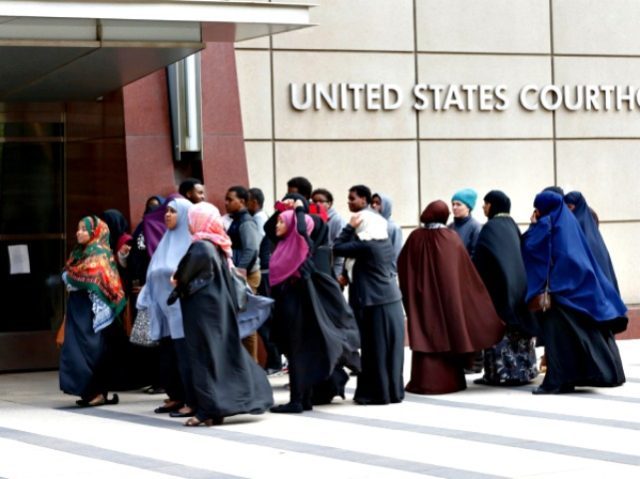(Total Views: 161)
Posted On: 03/20/2018 4:23:48 PM
Post# of 52067

Judge Ignores SCOTUS,
Tells Tennessee to Fund Federal Refugee Program
< >

A March 19 federal court decision requiring taxpayers in Tennessee to fund the federal government’s refugee program ignores a 2012 Supreme Court decision, says Richard Thompson, president of the Thomas More Law Center.
The judge’s 43-page decision on the refugee program “is filled with appealable issues,” Thompson told a Tuesday event hosted by the Center for Immigration Studies. “Our view is that we should appeal it” at no cost to state taxpayers, said Roberts, who is the lead pro-bono lawyer in the case.
“We would relish that … this case could very well end up in the Supreme Court,” he said.
A Supreme Court majority ruled in 2012 that the federal government cannot force states to fund federal programs, so “the judge basically backed off because it was too controversial and ruled on the basis of standing,” Thompson added.
The case is important for many states because the federal refugee program forces state taxpayers and governments to fund most of the welfare, aid, and education costs of federal government’s policy of dropping refugees and their children in the states, he said. If states balk at paying the costs, the federal government can threaten to cut their share of federal funding for the Medicare program, he said.
In Tennessee, the federal Medicare program funds one-fifth of the state budget, or $7 billion per year.
President Donald Trump has trimmed the program and will likely accept 30,000 refugees in 2018, down from President Barack Obama’s target of more than 100,000 refugees per year.
State legislators should agree to let the Thomas More Center appeal the case upwards, at no cost to the state taxpayers, said Thompson.
According to Reuters:
In a 43-page decision, Chief Judge S. Thomas Anderson of the federal court in Jackson, Tennessee said the state lacked legal standing to sue.
The judge called the prospect of a Medicaid funding loss “speculative,” and said Tennessee had taken no steps to deny Medicaid or other benefits to refugees …
“None of the events described by plaintiffs represents a departure from the understanding pursuant to which Tennessee has accepted Federal Medicaid funds for over forty years—that it must cover lawfully present aliens, including refugees, under its Medicaid program,” Anderson wrote …
The case is Tennessee et al v. U.S. Department of State et al, U.S. District Court, Western District of Tennessee, No. 17-01040.
The judge did not hold a hearing on the case but relied on written statements from the plaintiffs and defendants.
The judge’s decision shows the political power of the federal program, said Mark Krikorian, director of the center. “A state can check out of the refugee program, but it can never leave,” he said.
Tells Tennessee to Fund Federal Refugee Program
< >

A March 19 federal court decision requiring taxpayers in Tennessee to fund the federal government’s refugee program ignores a 2012 Supreme Court decision, says Richard Thompson, president of the Thomas More Law Center.
The judge’s 43-page decision on the refugee program “is filled with appealable issues,” Thompson told a Tuesday event hosted by the Center for Immigration Studies. “Our view is that we should appeal it” at no cost to state taxpayers, said Roberts, who is the lead pro-bono lawyer in the case.
“We would relish that … this case could very well end up in the Supreme Court,” he said.
A Supreme Court majority ruled in 2012 that the federal government cannot force states to fund federal programs, so “the judge basically backed off because it was too controversial and ruled on the basis of standing,” Thompson added.
The case is important for many states because the federal refugee program forces state taxpayers and governments to fund most of the welfare, aid, and education costs of federal government’s policy of dropping refugees and their children in the states, he said. If states balk at paying the costs, the federal government can threaten to cut their share of federal funding for the Medicare program, he said.
In Tennessee, the federal Medicare program funds one-fifth of the state budget, or $7 billion per year.
President Donald Trump has trimmed the program and will likely accept 30,000 refugees in 2018, down from President Barack Obama’s target of more than 100,000 refugees per year.
State legislators should agree to let the Thomas More Center appeal the case upwards, at no cost to the state taxpayers, said Thompson.
According to Reuters:
In a 43-page decision, Chief Judge S. Thomas Anderson of the federal court in Jackson, Tennessee said the state lacked legal standing to sue.
The judge called the prospect of a Medicaid funding loss “speculative,” and said Tennessee had taken no steps to deny Medicaid or other benefits to refugees …
“None of the events described by plaintiffs represents a departure from the understanding pursuant to which Tennessee has accepted Federal Medicaid funds for over forty years—that it must cover lawfully present aliens, including refugees, under its Medicaid program,” Anderson wrote …
The case is Tennessee et al v. U.S. Department of State et al, U.S. District Court, Western District of Tennessee, No. 17-01040.
The judge did not hold a hearing on the case but relied on written statements from the plaintiffs and defendants.
The judge’s decision shows the political power of the federal program, said Mark Krikorian, director of the center. “A state can check out of the refugee program, but it can never leave,” he said.
